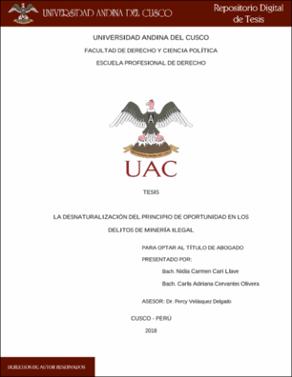| dc.contributor.advisor | Velásquez Delgado, Percy | |
| dc.contributor.author | Cari Llave, Nidia Carmen | |
| dc.contributor.author | Cervantes Olivera, Carla Adriana | |
| dc.date.accessioned | 2018-06-18T20:41:10Z | |
| dc.date.available | 2018-06-18T20:41:10Z | |
| dc.date.issued | 2018-03-05 | |
| dc.identifier.uri | https://hdl.handle.net/20.500.12557/1721 | |
| dc.description.abstract | El presente trabajo de investigación tiene por objeto analizar, por qué debe ser derogado el inciso 8, del artículo 2° del Código Procesal Penal Peruano, el cual permite la aplicación del principio de oportunidad en los delitos de Minería Ilegal. A consecuencia de la entrada en vigencia del Decreto Legislativo N°1102, mediante el cual se incorpora al Código Penal los Delitos de Minería Ilegal, y modifica el artículo 2 del Código Procesal Penal, referido al Principio de Oportunidad, surge la problemática generada por el Poder Ejecutivo, tras la promulgación del mencionado Decreto Legislativo, que da origen a la presente investigación. De este modo, no solo se pretende analizar porque no debe aplicarse el principio de oportunidad en la Minería Ilegal, sino también las consecuencias medioambientales, económicas y sociales, derivadas de su aplicación, que permiten demostrar que el principio de oportunidad está siendo desnaturalizado, debido a que los delitos de Minería Ilegal por su gravedad son sancionados con penas que comprenden entre 4 y 12 años de privación de libertad. | es_PE |
| dc.description.abstract | The purpose of this research work is to analyse, why the N° 8, article 2 of the Peruvian Penal Procedural Code, which allows the application of the principle of opportunity in illegal mining offences, should be repealed. As a result of the entry into force of the Legislative Decree n° 1102, by means of which the crimes of illegal mining are incorporated into the Penal Code, and amends article 2 of the Penal Procedural Code, referred to at the beginning of opportunity, arises the problematic generated By the executive power, following the promulgation of the aforementioned Legislative decree, which gives rise to this research. In this way, it is not only intended to be analyzed because the principle of opportunity in illegal mining should not be applied, but also the environmental, economic and social consequences derived from its application, which allow us to demonstrate that the principle of Opportunity is being denatured, because the crimes of illegal mining by its severity are punished with penalties that comprise between 4 and 12 years of deprivation of freedom. | en_US |
| dc.description.uri | Tesis | es_PE |
| dc.format | application/pdf | es_PE |
| dc.language.iso | spa | es_PE |
| dc.publisher | Universidad Andina del Cusco | es_PE |
| dc.rights | info:eu-repo/semantics/restrictedAccess | es_PE |
| dc.source | Universidad Andina del Cusco | es_PE |
| dc.source | Repositorio Institucional - UAC | es_PE |
| dc.subject | Minería ilegal | es_PE |
| dc.subject | Proceso penal | es_PE |
| dc.subject | Principio de oportunidad | es_PE |
| dc.subject | Consecuencias negativas | es_PE |
| dc.title | La desnaturalización del principio de oportunidad en los delitos de minería ilegal. | es_PE |
| dc.type | info:eu-repo/semantics/bachelorThesis | es_PE |
| thesis.degree.name | Abogada | es_PE |
| thesis.degree.grantor | Universidad Andina del Cusco. Facultad de Derecho y Ciencia Política | es_PE |
| thesis.degree.level | Titulo Profesional | es_PE |
| thesis.degree.discipline | Derecho | es_PE |

